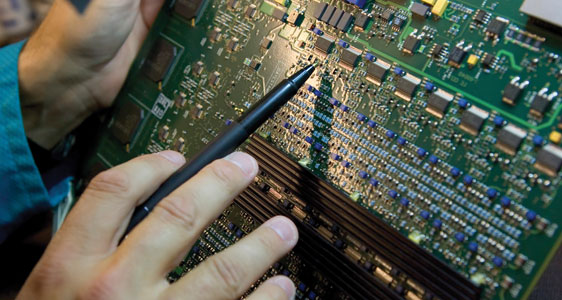Table of Contents
Introduction
Are you fascinated by gadgets, electronics, and the ever-evolving world of technology? Do you dream of contributing to the development of innovative electronic devices and systems? If so, a career as an Electronics Engineer might be the perfect path for you. This article will guide you through the steps to become an Electronics Engineer in India.
Understanding the Role of an Electronics Engineer
Electronics Engineers play a crucial role in designing, developing, and testing electronic systems, components, and devices. They work with cutting-edge technology, solving complex problems to create solutions that impact various industries. From smartphones and computers to medical equipment and renewable energy systems, Electronics Engineers contribute to every aspect of modern life.
Educational Requirements
High School Education
The journey to becoming an Electronics Engineer begins in high school. Focus on subjects like Physics, Mathematics, and Computer Science. A strong foundation in these subjects will prepare you for higher studies in electronics.
Bachelor’s Degree in Electronics Engineering
After completing high school, pursue a Bachelor’s degree in Electronics Engineering from a reputable university or college. The four-year program will provide you with theoretical knowledge and practical skills in various areas of electronics.
Master’s Degree (Optional)
While a Bachelor’s degree is sufficient for entry-level positions, obtaining a Master’s degree in Electronics Engineering can enhance your expertise and open up opportunities for higher positions and research-based roles.
Gaining Practical Experience
Internships and Industrial Training
During your academic years, participate in internships and industrial training programs. These experiences will expose you to real-world scenarios and help you apply theoretical knowledge to practical situations.
Projects and DIY Electronics
Apart from formal training, engage in personal projects and DIY electronics. Building circuits and devices on your own will boost your problem-solving skills and creativity.
Specialization and Advanced Courses
Electronics Engineering is a vast field with various specializations. Consider pursuing advanced courses in specific areas to become an expert in your chosen domain.
Communication Systems
Focus on communication systems to work with technologies like cellular networks, satellite communications, and data transmission.
Embedded Systems
Learn about embedded systems to design and develop microcontrollers and microprocessors used in electronic devices.
VLSI Design
Venture into VLSI (Very Large Scale Integration) Design to create complex integrated circuits used in chips and processors.
Robotics and Automation
Explore robotics and automation to design autonomous systems and cutting-edge industrial machinery.
Certifications and Licenses
Graduate Aptitude Test in Engineering (GATE)
Consider taking the GATE exam to qualify for admission to postgraduate programs in prestigious institutions and unlock various scholarships.
Professional Engineer (PE) License
Obtaining a PE license is essential for Electronics Engineers who want to offer their services directly to the public and take up leadership roles.
Networking and Professional Associations
IEEE – Institute of Electrical and Electronics Engineers
Join professional associations like IEEE to connect with experts, attend conferences, and stay updated with the latest advancements in the field.
IETE – Institution of Electronics and Telecommunication Engineers
Become a member of IETE to access a wide range of resources and networking opportunities in electronics and telecommunication.
Job Opportunities
Electronics Manufacturing Companies
Apply for positions in companies that specialize in the production of electronic components and devices.
Research and Development
Explore opportunities in research and development, where you can contribute to innovative projects.
Telecommunications
Work with telecommunication companies to develop communication networks and systems.
Automotive Industry
Join the automotive industry to work on cutting-edge technologies used in modern vehicles.
Government Sector
Consider government job opportunities in agencies and organizations that require Electronics Engineers for various projects.
Entrepreneurship and Startups
If you have a passion for innovation and an entrepreneurial spirit, consider starting your own electronics-related business or join a startup.
Keeping Up with Technological Advancements
Stay updated with the latest trends and technological advancements in the field of electronics through continuous learning and research.
Soft Skills Development
Alongside technical skills, focus on developing soft skills like communication, teamwork, and problem-solving, which are essential for a successful career.
Building a Strong Portfolio
Create a portfolio showcasing your projects, achievements, and practical work to impress potential employers or clients.
Resume Building and Interview Preparation
Craft a professional resume and prepare for interviews to increase your chances of landing the job you desire.
Salary and Career Growth
Explore the salary prospects and career growth opportunities in the electronics engineering field in India.
Challenges and How to Overcome Them
Understand the challenges faced by Electronics Engineers and learn strategies to overcome them.
Conclusion
Becoming an Electronics Engineer in India requires dedication, hard work, and a passion for technology. By following the outlined steps and continuously improving your skills, you can embark on a rewarding and fulfilling career in the dynamic world of electronics.
FAQs
Q- What is the minimum educational qualification to become an Electronics Engineer in India?
A- To become an Electronics Engineer, you need a Bachelor’s degree in Electronics Engineering.
Q- Are there any certifications that can enhance my career prospects?
A- Yes, certifications like GATE and PE license can boost your career in electronics engineering.
Q- What are the popular specializations within Electronics Engineering?
A- Some popular specializations include Communication Systems, Embedded Systems, VLSI Design, and Robotics.
Q- Can I pursue a Master’s degree after completing my Bachelor’s in Electronics Engineering?
A- Yes, pursuing a Master’s degree can provide advanced knowledge and more career opportunities.
Q- What are some essential soft skills for Electronics Engineers?
A- Effective communication, teamwork, and problem-solving are crucial soft skills for success in this field.




